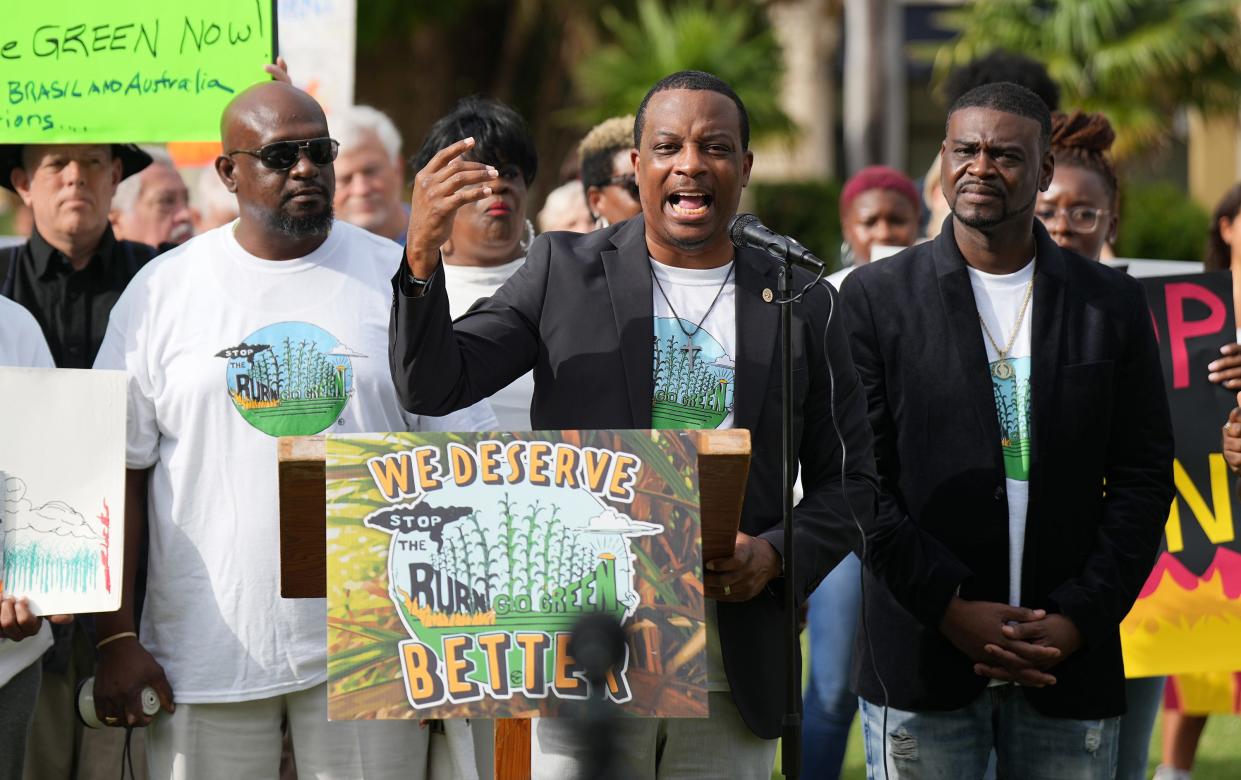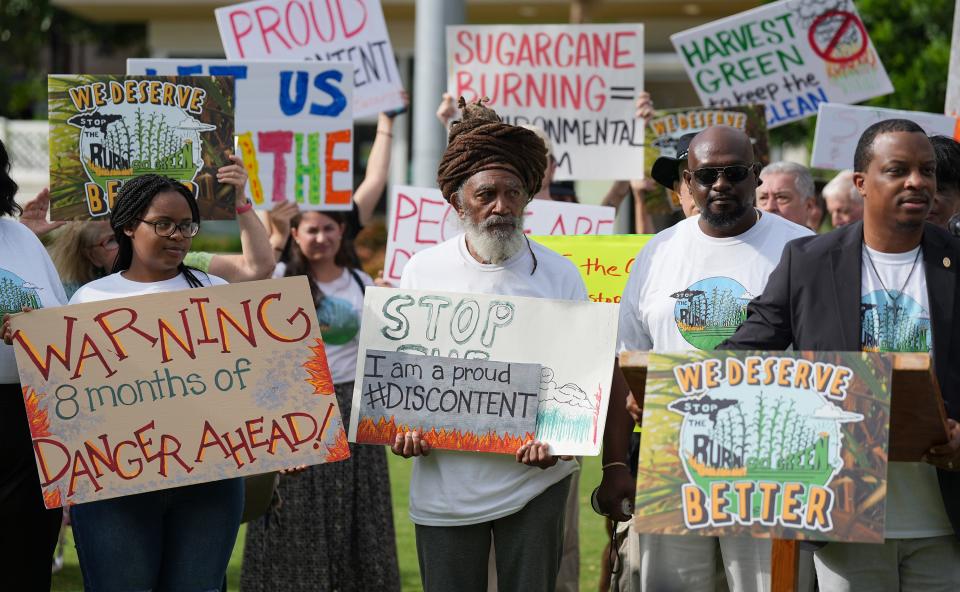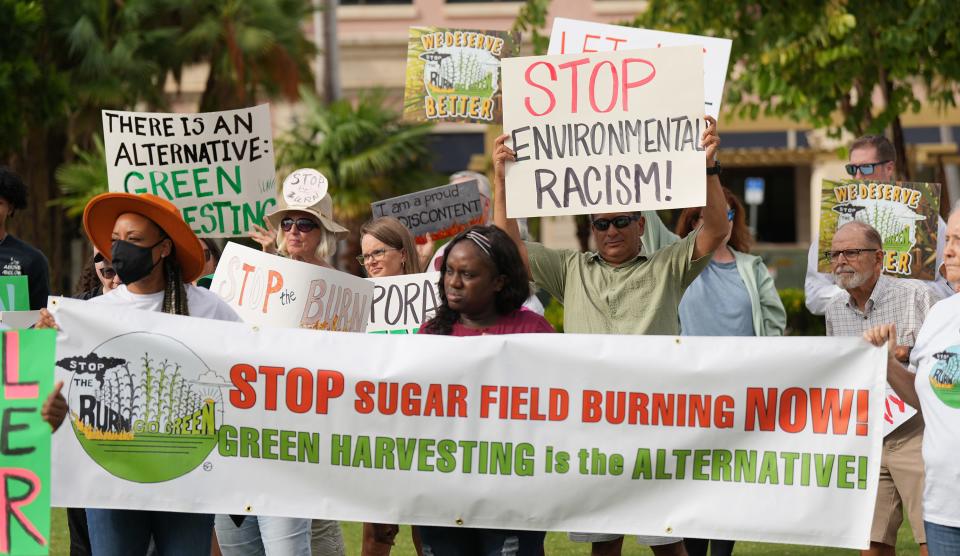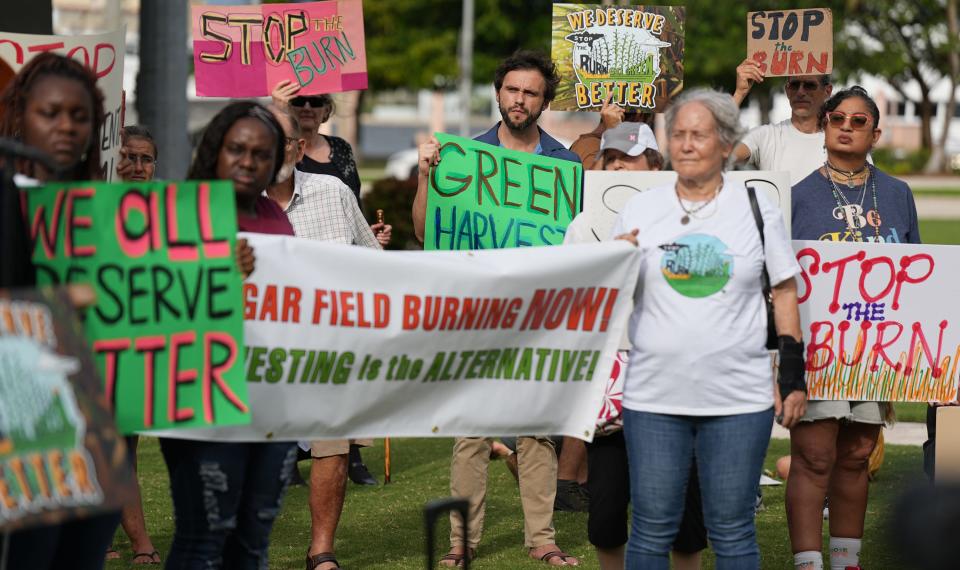'Get off our lungs!': 60 rally against sugar-cane burning in Glades

WEST PALM BEACH — Glades residents who want to end the sugar-cane burning they say pollutes their communities joined environmental activists Saturday in downtown West Palm Beach to push back against industry claims that their demands would cost jobs.
About 60 people rallied that afternoon on the lawn of Nancy Graham Centennial Square Park, across the street from the Clematis Street headquarters of Florida Crystals, one of the biggest sugar-growing companies in the state. The rest of the plaza was mostly empty.
One speaker after another railed against big sugar companies’ pre-harvest practice of burning cane from October through May on vast farmlands east and south of Lake Okeechobee. The soot from the smoke rains down on towns in what residents call “black snow.” The pollution infects people and, scientists have shown, can kill them prematurely.
Read The Post's investigation: The Smoke Comes Every Year. Sugar Companies Say the Air Is Safe.
Subscriber Exclusive: Glades residents left behind: Nikki Fried’s ‘changes’ to cane burning served only Big Sugar
Sugar cane firepollution kills up to three South Floridians yearly, study finds
“Get off our lungs!” Kina Phillips, 47, of South Bay demanded. “We’re breathing in poison!”
Phillips and other Glades residents, along with former elected officials from the region, have been working for years with local members of environmental group The Sierra Club, to get sugar growers to switch to “green” mechanical methods that remove sugar cane husks without polluting the air. Their campaign is called Stop The Burn Go Green.
“When I say ‘Go,’ you say ‘Green,’” former Pahokee Mayor Colin Walkes yelled to the audience. He led the crowd in other call-and-responses such as “stop the burn.” Rallygoers held signs slogans such as that or “Harvest green to keep the air clean.”
Sugar growers and their allies have claimed the anti-burn coalition wants to put farmers out of business.

A group called Sustainable Agricultural Fire Education (S.A.F.E.) Communities, run by Glades County sugar farmer Amy Perry, has sent mailers to residents around Lake Okeechobee claiming that non-burning methods would spread snakes, rats and wildfires. Another one called the anti-burn movement “paid agitators” who want “to shut down farming” in and around the lake.
“We don’t want the sugar mills to close down,” Phillips said at the rally. “We’re not coming to get the jobs. We love our people and their jobs.” Instead, she and other speakers said, cleaner harvesting would create more jobs.
Anywhere from two to six people in South Florida die prematurely each year because of pollution from sugar cane fires, Florida State University scientists said in a study published in August.
5 things to know from Palm Beach Post/ProPublica Pulitzer finalist on cane burning
Researchers used air monitors in Belle Glade and Royal Palm Beach, satellite images and state burn authorizations to track exposure to pollution released by sugar cane fires from October to March each year.
Growers set about 400,000 acres of field ablaze to burn off the cane's tough outer layer before harvesting their crops. Studies have shown that fine particle pollution is dangerous because it penetrates deeply into the lungs, causing potentially fatal conditions that include coronary artery disease, lung cancer and stroke.

One of Stop The Burn’s leaders, Steve Messam, noted that when well-off residents of Wellington and Royal Palm Beach flooded state officials in 1991 with complaints of smoke blowing east over their communities, the Florida Department of Agriculture banned growers from burning when winds blow in their direction.
“The sugar industry’s always asking where’s the data,” Messam said. “The people in Wellington didn’t provide one shred of data.” He added, “But when the wind is blowing west on Black and brown people, it’s burn, baby, burn.”
Unlike Wellington, the Glades-area cities of Belle Glade, Pahokee and South Bay are majority Black, with Hispanic people as the second-largest demographic. Their incomes are much lower.
Wellington-based political consultant Jody Young spoke in support of Stop The Burn’s efforts and called on residents in and around the city to demand an end to cane burning.
When Young worked as a manager of the Eckerd Pharmacy in Belle Glade, he said, and volunteered at the schools. “I could not believe what these kids were going through,” he said. “Smoke, ash, chemicals in the air. They treat that stuff with weed killer before they burn it. That stuff comes down and you breathe that crap in. Good luck not getting cancer.”
Concerns about the effects of pollution from the practice have led Brazil and other countries as well as states, including Louisiana, to abandon the practice in favor of cleaner mechanical harvesting.
“Our goal is to one day be able to say this was the last burn season,” Messam said in an interview. He ran unsuccessfully in March 2021 for Belle Glade City Commission, losing to Joaquin Almazan, who was backed by sugar and farming interests.

That election also saw victories by Andrew “Kenny” Berry and incumbent Mary Ross Wilkerson, supported in part by sugar companies.
Just over 1,900 voters out of an electorate of more than 7,200 cast their ballots in that election. Commissioners’ terms end March 2024, when they’re up for reelection. Messam said he has not made up his mind about running again.
Robert Mitchell, the Belle Glade resident who ran against Wilkerson in 2021, also spoke at the rally. Former South Bay Mayor Shanique Scott and Lake Worth Beach City Commissioner Reinaldo Diaz attended as well.
Chris Persaud is The Palm Beach Post's data reporter. Email him at cpersaud@pbpost.com.
This article originally appeared on Palm Beach Post: Glades residents rally against sugar-cane burning in harvest

